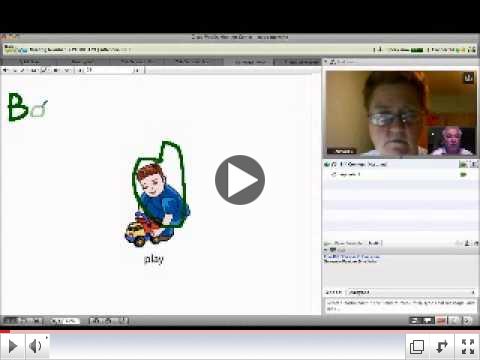 |
 |
Editor's Note: Happy Holidays from Aphasiatoolbox
The staff of Aphasiatoolbox wishes you a happy holiday season.
As a person recovered from aphasia, I would like to share with you some of my thoughts on aphasia. This article is structured around a set of character qualities that personally helped me.
----------------------------------------------------------
A
Acceptance means embracing what is, rather than wishing for what is not. When we accept difficult realities, we are able to discover whatever positive feelings and experiences may be possible in that situation.
Life is a series of natural and spontaneous changes. Don't resist them - that only creates sorrow. Let reality be reality. Let things flow naturally forward in whatever way they like.
Patience is allowing time to run its course and allowing people, including ourselves, to work and grow at our own pace. Actively recovering from aphasia requires the patience to persist and persevere.
Rivers know this: there is no hurry. We shall get there some day.
* Author: A. A. Milne author (1882-1956)
H Humor is the ability to laugh at ourselves - to brighten any situation or conversation by finding the light, quirky dimensions.
Humor is the affectionate communication of insight. * Author: Leo Rosten
A Adaptability or flexibility means being able to change as circumstances require it. We must adjust and learn as we go. Converting yourself from a person WITH aphasia to a person RECOVERING from aphasia requires cognitive flexibility.
When one door of happiness closes, another opens; but often we look so long at the closed door that we do not see the one which has been opened for us. * Author: Helen Keller S Strength is not about finding life consistently easy; it is about doing what needs to be done.
I think a hero is an ordinary individual who finds strength to persevere and endure in spite of overwhelming obstacles. * Author: - Christopher Reeve a.k.a. superman
I
Initiative means seeing something that needs to be done and starting it. It means taking the first step rather than waiting for a "better time" or for someone else to make you do it. For people recovering from aphasia (PRA), it means actively becoming the pilot of your own recovery.
Don't be afraid to take a big step. You can't cross a chasm in two small jumps.
* Author: David Lloyd George, British prime minister (1863-1945) A Action is how wisdom changes the world. Without action, our knowledge and insights die with us. PRA active in aphasiatoolbox programs aggressively travel the pathway of recovery. Always Remember to take your Vitamins: Take your Vitamin A for ACTION, Vitamin B for Belief, Vitamin C for Confidence ,Vitamin D for Discipline, Vitamin E for Enthusiasm!! * Author: Pablo Valle
|
Happy Holidays from the Aphasia Recovery Connection
|
Editor's Note:
Our feature column this month is written by Kim Huggins, mother of Christine Huggins, co-founder of the Aphasia Recovery Connection. Kim discusses "unexpected sadness, pain, challenges, and new friends."
Reprinted with Permission
----------------------------------
Unforeseen Happiness
By Kim Huggins, October 2013
The past two years have been filled with unexpected sadness, pain, challenges, and new friends! My daughter, Christine, 26, had just passed the Ohio Bar Exam and had landed a fabulous job as a Federal Bankruptcy Clerk. She and her fianc� were planning a Christmas wedding. She saved money from her first paychecks to buy a beautiful satin gown! The date was set & deposits paid.
Jim and I were so excited for our family. Nick had earned a golf scholarship at Northern Illinois and would be leaving for college. We were about to become "empty nesters." I would teach second grade and Jim would practice law for a few more years and then we would retire. Perfect plan...
Please read the rest of Kim's article.
|
Christine Huggins Appointment
Christine Huggins, the co-founder of the Aphasia Recovery Connection, has been appointed to the Ohio Governors Council on People with Disabilities for a term beginning December 9, 2013.
Since beginning with the aphasiatoolbox.com program, Christine has helped to create the Aphasia Recovery Connection (ARC) a Facebook page devoted to people with aphasia, friends and families. She facilitates an online chat and has presented at several venues about aphasia recovery. Christine has begun to write articles for the aphasiatoolbox newsletter.
|
Laura Cobb proves a sense of humor and a resilient attitude can get you through anything. Laura, a bright 27-year-old from St. Louis has taken to YouTube to share a humorous and informative video about what it's like to live with expressive aphasia.
|
Concerning aphasia, DID YOU KNOW?
- 40% of stroke patients suffer from aphasia.
- 1 in 250 people suffer from aphasia in the US. That's about 1,000,000 people.
- Roughly 100,000 Americans acquire the disorder every year.
- Aphasia is not racist. It affects everyone.
- Aphasia affects language processing.
- Aphasia is NOT Alzheimer's. The thoughts are there, but the speech isn't.
|
The American Speech-Language-Hearing Association and Special Interest Group 18 have published an overview of telepractice.
ASHA adopted the term telepractice (rather than the frequently used terms telemedicine or telehealth) to avoid the misunderstanding or misperception that these services are used only in health care settings.
The telepractice overview also includes information on medicare reimbursement, specifically:
Medicare reimburses some telemedicine providers for specific services under specified conditions, but audiologists and speech-language pathologists and other rehabilitation professionals are not presently included in legislation as eligible providers. ASHA and other organizations have been actively lobbying for legislation to expand eligibility to include audiologists and speech-language pathologists among others.
|
Aphasia & Speech Therapy in the Comfort of Your Home
If your goal is to aggressively continue your speech-language recovery, you must try telepractice or telerehabilitation.
Aphasia experts can conduct your treatment sessions over the Internet and it is easier than you can imagine.
aphasiatoolbox is providing a 45 minute aphasia consultation with treatment recommendations at no charge as a SPECIAL OFFER to subscribers of Paul Berger's Stroke Survivor
newsletter.
Contact Bill Connors at [email protected] or phone: 724.494.2534.
|
|
|
|
|
|
"Finally, when finding words is hard, finding help is easy . . . with BCAT."
|
Happy Holidays!
This is Sharon Rennhack, the chief editor for the aphasiatoolbox newsletter.
Concerning Nov 2013 Survey,
Aphasiatoolbox received a good response to our first survey. We will send a summary of the results in the January 2014 newsletter.
These are some of the highlights that we found so far:
> Who's reading the Aphasiatoolbox newsletter?
Two -thirds of our responders are speech/language pathologists, and the rest of the respondents to the survey were either people with aphasia or caregivers or a friend of a person with aphasia.
> What did you find most useful in the 2013 newsletters?
About two-thirds of the survey responders like to read the news section about aphasia.
About 40% of the survey participants like to use the free protocols and materials.
> What do you want to read in 2014?
Wow! 80% of our responders want to read about tools, materials, and apps to help with aphasia recovery, followed by information on new and novel treatments for aphasia and related disorders.
We're working on our action plan for 2014 in order to deliver what you requested. In our January 2014 newsletter, we'll share the results of the survey.
In this edition:
Bill Connors discusses a few of his favorite exercises for aphasia related to word finding, numbers and sentence production recovery and practice. He also demonstrates how telepractice can be effectively used for maximizing aphasia treatment and practice.
Kim Huggins discusses the events during the past 2 years, in her feature article - "Unforeseen Happiness."
Laura Cobb shows us how a sense of humor can always help!
We wish you Happy Holidays and Happy New Year!!
Sharon Rennhack
Chief Editor
Aphasiatoolbox
|
Everyday Miscommunication
|
Editor's Note:
A person with aphasia may have problems with his/her language processing skills--for example, the ability to read, write, listen, speak and be understood--including their ability to understand others.
In this edition, Master Clinician Bill Connors offers free protocols for particular problem areas, including:
- using numbers in everyday situations;
- recalling words better through building semantic relationships;
- thinking and talking in sentences.
> Problem Area: Dealing with Numbers
Numbers continue to play an important role in life even in the presence of aphasia. The
Numeracy module in the Aphasia Sight Reader is designed to help the client to improve his/her ability to use numbers in everyday life and to overcome acalculia, an acquired math problem after a stroke. In keeping with the robust nature of aphasiatoolbox programs, it also incorporates AphasiaPhonics tactics to improve spelling, reading and speaking.
 | | Numeracy 12 23 13 |
> Problem Area: Speaking and thinking in sentences
We speak in canonical sentences; that is a sentence that includes a subject, verb and object. Clients at aphasiatoolbox start working and practicing in sentences early in the treatment program. It is that important.
In this video, Bill demonstrates the
Canonical Sentence protocol using the telepractice.
 | | Canonical Sentences 12 22 13 |
>
Problem Area: Cognition
The Semantic Cognition module in the Aphasia Sight Reader helps the ability to fluently recall and use words in a divergent manner. This supports the ability to converse with others. This module exploits neuroplasticity and improves cognitive skills.
Again demonstrating telepractice, in this video, Bill demonstrates the Semantic Feature Stimulation protocol.
 | | Semantic Feature Stimulation 12 22 13 |
For information on how we can help you or your client, click here to contact us or phone 724-494-2534.
|
|
|
|
|